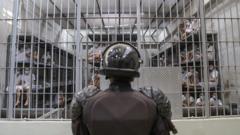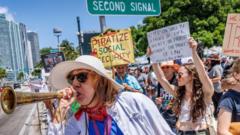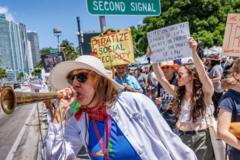A landmark legal decision by the Supreme Court has temporarily halted the deportation of Venezuelan nationals detained in Texas, following objections from civil rights advocates.
Supreme Court Intervenes to Halt Deportation of Venezuelan Detainees

Supreme Court Intervenes to Halt Deportation of Venezuelan Detainees
The U.S. Supreme Court pauses the Trump administration's deportation of Venezuelan detainees amid legal challenges.
The US Supreme Court has intervened to pause the deportation of a group of Venezuelan individuals held in detention centers across north Texas. This decision came after complaints from civil liberties organizations asserting that these detainees have not been afforded the opportunity to contest their deportation in a court of law. The men were being held under the 18th-Century Alien Enemies Act, which permits the government to detain and deport citizens of "enemy" nations without the usual legal processes.
Former President Donald Trump leveraged this archaic law, previously invoked only during wartime, to deport individuals he labeled as members of the Venezuelan gang Tren de Aragua, accusing them of conducting acts of violence on US soil. Since taking office in January, Trump's stringent immigration measures have faced several legal obstacles.
As of early April, of the 261 Venezuelans deported to El Salvador, 137 were expelled under this controversial act, according to an administration official. Following a temporary block on deportations by a lower court in mid-March, the Supreme Court initially allowed the use of the Alien Enemies Act but specified that individuals must be given a fair chance to contest their deportation.
A lawsuit filed by the American Civil Liberties Union (ACLU) highlighted critical issues: detainees reportedly received notices in English, which one individual could not comprehend due to language barriers, and they were not properly informed of their right to litigate against their removal. The ACLU emphasized that without judicial intervention, many could face dire consequences upon returning to El Salvador, where they might be imprisoned for life.
Notably, Supreme Court Justices Clarence Thomas and Samuel Alito dissented during this ruling. Amidst these legal issues, Trump emphasized his commitment to eradicate foreign gangs causing turmoil in the U.S., pointing to a case where the government mistakenly deported a man while claiming he was involved with the MS-13 gang—a claim his legal representatives and family dispute.
Despite the unanimous Supreme Court order requiring the government to facilitate the return of the improperly deported Kilmar Ábrego García, the Trump administration has declared he will "never" be permitted to re-enter the US. Maryland Senator Chris Van Hollen recently visited García in El Salvador, noting his transfer from the harsh environment of Cecot (Terrorism Confinement Centre) to another facility, amidst concerns for his well-being.
Former President Donald Trump leveraged this archaic law, previously invoked only during wartime, to deport individuals he labeled as members of the Venezuelan gang Tren de Aragua, accusing them of conducting acts of violence on US soil. Since taking office in January, Trump's stringent immigration measures have faced several legal obstacles.
As of early April, of the 261 Venezuelans deported to El Salvador, 137 were expelled under this controversial act, according to an administration official. Following a temporary block on deportations by a lower court in mid-March, the Supreme Court initially allowed the use of the Alien Enemies Act but specified that individuals must be given a fair chance to contest their deportation.
A lawsuit filed by the American Civil Liberties Union (ACLU) highlighted critical issues: detainees reportedly received notices in English, which one individual could not comprehend due to language barriers, and they were not properly informed of their right to litigate against their removal. The ACLU emphasized that without judicial intervention, many could face dire consequences upon returning to El Salvador, where they might be imprisoned for life.
Notably, Supreme Court Justices Clarence Thomas and Samuel Alito dissented during this ruling. Amidst these legal issues, Trump emphasized his commitment to eradicate foreign gangs causing turmoil in the U.S., pointing to a case where the government mistakenly deported a man while claiming he was involved with the MS-13 gang—a claim his legal representatives and family dispute.
Despite the unanimous Supreme Court order requiring the government to facilitate the return of the improperly deported Kilmar Ábrego García, the Trump administration has declared he will "never" be permitted to re-enter the US. Maryland Senator Chris Van Hollen recently visited García in El Salvador, noting his transfer from the harsh environment of Cecot (Terrorism Confinement Centre) to another facility, amidst concerns for his well-being.




















